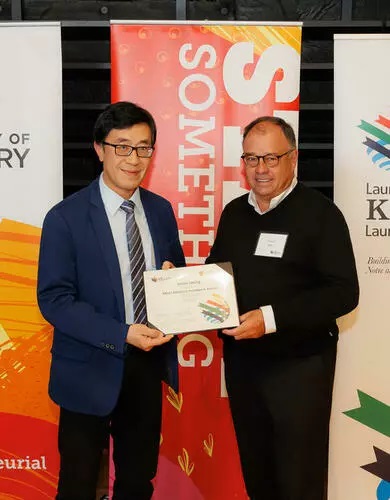
Henry Leung poses with Killam trustee Bernard Miller at the UCalgary Killam Awards event. Photo Credit: Riley Brandt, University of Calgary
Dr. Henry Leung has seen it all during his decades-long career.
His ability to adapt and stay relevant in an ever-evolving industry has made the Schulich School of Engineering professor a highly decorated professor and researcher.
A Fellow of the Institute of Electrical and Electronic Engineers (IEEE), Canadian Academy of Engineering and the Engineering Institute of Canada, Leung, PhD, is now being recognized for his work with the 2024 Killam Research Excellence Award.
The award is presented to an individual who has made outstanding contributions to research.
"I am honoured and happy to be recognized for this prestigious award," Leung says. "I'm grateful for the acknowledgment of the research and work that's been done here at the University of Calgary over the decades."
He was among those honoured at this year's UCalgary Killam Awards luncheon on Oct. 24.
Pride in performance
Leung's research interests have always been wide-ranging, including robotics and unmanned vehicle systems, space systems, multi-sensing and avionics, image processing, and machine learning.
"I take a lot of pride in my research and in being able to help inspire future engineers in our classrooms."
"It provides motivation for me to keep moving forward, striving for excellence and bringing contributions with real-world applications," Leung says.
Thanks to a strong support system at UCalgary and across industry, the Department of Electrical and Software Engineering professor says he's been able to make an impact across international borders by developing and embracing innovative solutions and technologies.
Changing with the times
Collaboration and active participation in community are keys to success in Leung's eyes.
He says maintaining long-term relationships with industry and government partners has helped create some of the solutions he's worked on.
"Working with my team and collaborative partners, we are able to use new technology such as sensors, hardware and software algorithms, and new ways to improve current approaches to stay updated on the latest developments," Leung says.
It has also helped him keep up with the digital evolution, as he says it's important to acknowledge that research and commercialization are complementary to innovation - especially in the field of autonomous systems and artificial intelligence.
Excited for what's to come
As the lead of the Autonomous Systems and Intelligent Sensing Laboratory at UCalgary, Leung says his research group is working on several projects with a variety of stakeholders.
He says it's an exciting time to have a hand in so many areas of research, as we have become more connected than ever before.
"I'm so proud to help provide my team with a variety of opportunities to collaborate with and make impact in international industrial and defence projects," Leung says. "We are able to develop cutting-edge technology and engage the entire development cycle from theory-conceptual research to prototyping and real-life testing."
With so much information at our fingertips, he says the possibilities are endless on the kinds of machine learning and remote sensing applications which could be developed.











